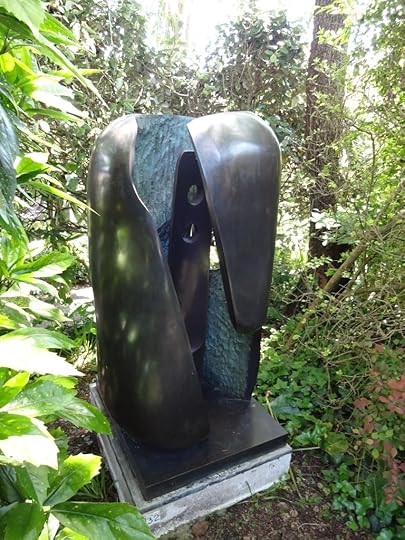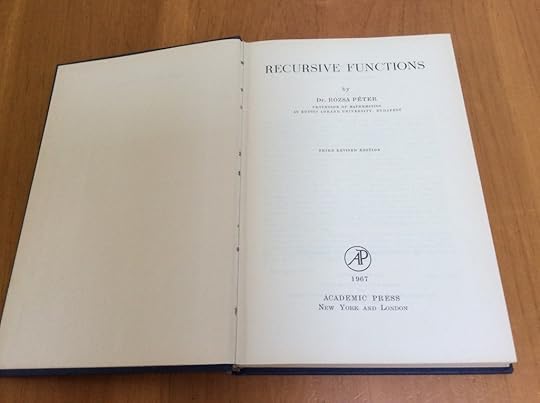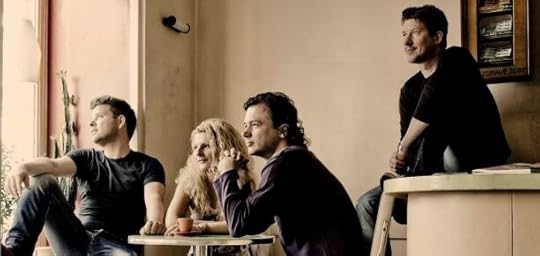Peter Smith's Blog, page 109
May 16, 2014
Postcard from Cornwall
We have been away from Cambridge in Cornwall, where the weather has been extraordinarily kind. So there’s been a lot of sitting around in the sun and walking by the sea, or in gardens like Trelissick (which you can reach, delightfully, by ferry). Wonderful.
We did make one trip across to St Ives, which did not strike us as being as nice a place as reputation would have it. But it was more than worth the journey, just to see the Barbara Hepworth Museum and Sculpture Garden.
Here is Hepworth, writing in The Studio, 1946:
“I have always been interested in oval or ovoid shapes. The first carvings were simple realistic oval forms of the human head or of a bird. Gradually my interest grew in more abstract values – the weight, poise, and curvature of the ovoid as a basic form. The carving and piercing of such a form seems to open up an infinite variety of continuous curves in the third dimension, changing in accordance with the contours of the original ovoid and with the degree of penetration of the material. Here is sufficient field for exploration to last a lifetime.”
“Before I can start carving the idea must be almost complete. I say ‘almost’ because the really important thing seems to be the sculptor’s ability to let his intuition guide him over the gap between conception and realization without compromising the integrity of the original idea; the point being that the material has vitality – it resists and makes demands.”
“I have gained very great inspiration from Cornish land- and sea-scape, the horizontal line of the sea and the quality of light and colour which reminds me of the Mediterranean light and colour which so excites one’s sense of form; and first and last there is the human figure which in the country becomes a free and moving part of a greater whole. This relationship between figure and landscape is vitally important to me. I cannot feel it in a city.”
Thoughts of a lucidity that contrasts, as Mrs Logic Matters tartly remarked, with the sort of nonsense you can get from modern artists writing about their work …
May 2, 2014
Charles Parsons’s new book — let’s discuss it!
Charles Parsons has a new book out, Philosophy of Mathematics in the Twentieth Century
a collection of his essays (all but one, I think, previously published but with some new postscripts). Here’s the table of contents.
Parsons is always worth reading and thinking about. So I’m going to be reviewing this for Mind, since I’ll enjoy the chance of re-reading some of these essays, and catching up with those I haven’t read before. My plan is to post about some thoughts on the essays in order, starting about three weeks hence.
I’m announcing this in advance to give you a chance to get a copy of the book (or persuade your librarian to do a rush acquisition), though I’ll also post links to previously published versions of essays, where available. I hope some will be inspired to join in discussion in the comments.
April 30, 2014
Angela Hewitt plays the Art of Fugue
Last night here in Cambridge, a truly remarkable concert. Remarkable for a start that such an austere programme — a performance of the Art Of Fugue on the piano — was sold out, and to an audience seemingly of much wider age spread than is too often the case with concerts here. Remarkable in the event for the utter concentration of the audience, silent and hardly moving in their seats for an unbroken hour and a half. But most remarkable, of course, for the performance by Angela Hewitt, which made an absolutely compelling case that this music is not just for the study, or for solitary listening with score in hand to follow the twists and turns, but can work in the concert hall. Judging from the reception at the end, the audience were more than won over. There was a shared sense that we had witnessed musicianship of a quite astonishing kind in action.
You’ll have to take my word for it for now: but Angela Hewitt has recorded a CD of the Art of Fugue for Hyperion (to add to her other stunning Bach discs) which will be out in the autumn, and you can judge for yourself then — though there was something magical about being there in the atmosphere at the live concert. I predict you will be bowled over.
The picture isn’t from last night’s concert but I think characteristic. But here’s visual proof that Angela Hewitt was indeed in Cambridge!
Recursive pleasures
I’m much enjoying at the moment re-reading Hartley Rodgers’s Theory of Recursive Functions and Effective Computability. What prompts me to take the book off the shelf again is the treatment of constructive ordinals some two hundred pages in; but (one of the upsides of retirement) I’ve got the time to start reading from the beginning, and it is well worth spending the time doing so. The book is as good and illuminating as I remembered it as being. In fact more so, as I’m sure I didn’t really appreciate it, back in the day.
I bought my copy at the end of 1970, and paid seven pounds and nine shillings for it (the bookseller’s pencilled markings are still on the flyleaf). That was a lot more than we could afford, and I expect I didn’t fess up to my extravagance, for it would then have been about 8% of my monthly take-home pay. Such was my devotion to logic. Or my obsessive book-buying habit.
The book-buying has had to be much reduced, as we are pretty much constrained to a one-in, one-out policy (not of course, that it quite works like that). But I did get in the post today a copy of Rózsa Péter’s great Recursive Functions – the copy was relatively inexpensive and though it once belonged to the library at the National Physical Laboratory was seemingly hardly touched. I’m not sure quite why, but I take real pleasure in having a copy at last.
Question (since the gender gap is vexing the philosophical interwebs these days): is Rózsa Péter the only woman so far who is the sole author of an indisputably significant mathematical logic book? Or am I having a senior moment and forgetting someone? (Even more run of the mill math. logic textbooks solely by women seem very few and far between: there’s Judith Roitman’s nice set theory text, and then ….?)
April 25, 2014
The consistency of NF
Randall Holmes on his website now says he
… currently claim[s] to have a proof of the consistency of New Foundations. The current document describing the proof is here. Comments and questions from those who understand the technical issues are very welcome; I apologize in advance for the still difficult state of the text, and I am sure that I don’t yet have all the bugs out.
If you have an amateur philosophical interest in NF, I do not think it likely that you will get anything out of this very technical and not yet very polished document, and I am not likely to answer your questions about it. Be advised that in my opinion (which I know is not universal) the famed NF consistency problem has nothing at all to do with philosophical issues which Quine’s set theory might be taken to address: I think that NFU addresses these issues to exactly the same extent and its consistency and mathematical strength have been settled issues since 1969.
April 20, 2014
Teach Yourself Logic, new layout
The Teach Yourself Logic Guide has a new look.
Now, instead of being a standard A4 PDF, it should be an ideal size for reading on screen. Read it either (i) on an iPad (download in Safari, open e.g. in iBooks), or (ii) on a lap-top (e.g. read two pages side-by-side using Adobe Reader in full-screen mode). The changes in this new version are modest, then, but should I hope make the Guide significantly more readable.
Comments on the new layout, for or against, are welcome.
April 4, 2014
The Pavel Haas Quartet live, again
One of the delights and frustrations of concert-going is how unpredictable the experience can be. Fine ensembles can have off-days. On the frustrating side, then, the last two outings to hear the usually stellar Academy of Ancient Music were, for different reasons, pretty disappointing. Richard Tognetti’s playing style just didn’t gel with the band’s on the evening I heard him as a guest director in Cambridge. And Richard Egarr’s exaggerated fortepiano embellishments in Haydn at their next concert were positively camp rather than appropriately playful.
On the side of delight, there was the Pavel Haas Quartet again, at their most recent concert at the Wigmore Hall. They hadn’t chosen the most audience-pleasing of programmes either (which perhaps is why there was a surprising sprinkling of empty seats). But from the very first moments when they launched into Smetena’s second quartet, they were on fire. Even the composer acknowledged that the first movement “is quite unusual in style and difficult to follow, as if the whole movement were the product of whim….”. And by the time we get to the harmonically dissonant final movement, lesser performances can leave us lost. But the Pavel Haas made this their own, gave such shape and coherence to the piece, played with such attack and mutual understanding, that there was a storm of applause. By far the best performance of the Smetena I have ever heard, on disc or otherwise.
There followed a fine performance of Dvorak’s “Slavonic” quartet. And then after the interval, the Pavel Haas played the Brahms Op. 51, No. 2. Again, not the easiest work to communicate, but by this time the quartet had the audience utterly in their spell, and played with mesmerising authority to produce another astonishing performance. Once more, this was better than any recording I know of the piece, by some way. This was playing of unsurpassed musical understanding and intensity.
If you ever have the chance to hear the Pavel Haas Quartet play live, grab it.>
March 28, 2014
The Mathematical Universe Hypothesis
“Our external physical reality is a mathematical structure.” That’s how Wikipedia sums up the cosmologist Max Tegmark’s mathematical universe hypothesis. Looks as if some conceptual untangling is needed. Scott Aaronson makes a great start in a wonderful blogpost here.
March 20, 2014
Teach Yourself Logic, again
There’s an even bigger, even better, shiny new Version 10.0 of the TYL Study Guide now available at the usual URL http://www.logicmatters.net/tyl/ Form an orderly queue …
The structure of the Guide has significantly changed again (hence the jump in version number). The key section on basic first-order logic at the beginning of the mathematical logic chapter was getting more and more sprawling: it has now been hived off into a separate chapter, divided into sections, and further expanded. My sense is that quite a few readers are particularly interested in getting advice on this first step after baby logic, so nearly all the effort in this particular revision of the Guide has been concentrated on making improvements here. So, inter alia, there are new comments on four outstanding relatively elementary books: Derek Goldrei’s Propositional and Predicate Calculus, Melvin Fitting’s First-Order Logic and Automated Theorem Proving, Raymond Smullyan’s Logical Labyrinths, and (not least) Jan von Plato’s very recent Elements of Logical Reasoning.
I still intend sometime to return to say more about the last of these when I’ve had a chance to re-read it: it is in many ways a very welcome addition to the literature. For the moment, I just remark that this book is based on the author’s introductory lectures. I rather suspect that without his lectures and classroom work to round things out, the fairly bare bones presented here in a relatively short compass would be quite tough as a first introduction, as von Plato talks about a number of variant natural deduction and sequent calculi. But suppose you have already met one system of natural deduction, and (still a beginner) want to know rather more about ‘proof-theoretic’ aspects of this and related systems. Suppose, for example, that you want to know about variant ways of setting up ND systems, about proof-search, about the relation with so-called sequent calculi, etc. Then this is a very clear, very approachable and interesting book. Experts will see that there are some novel twists, with deductive systems tweaked to have some very nice features: beginners will be put on the road towards understanding some of the initial concerns and issues in proof theory.
March 11, 2014
Logic matters, but not that much, apparently …
Looking at the Leiter blog … and no, this isn’t going to be about certain recent kerfuffles, where there has perhaps been rather too much rushing to judgement.
As I was saying, looking at the Leiter blog, I’m struck by the new list of “recent hires“. So far, there are sixty two “tenure-track and post-doc” appointments listed. Only four mention logic at all in any shape or form, and judging from publication lists and websites, the relevant people’s interests are in non-technical philosophy of logic overlapping with the philosophy of language and epistemology (topics like vagueness, theories of truth, the epistemology of basic logical principles, the sense in which Russell was a logicist). Only one person on the whole list mentions philosophy of mathematics at all (and again, only with that same historical paper on Russell’s logicism to show for it). Fine topics to be interested in, but not perhaps at the core of logic or philosophy of maths.
It could be that Leiter’s list — or rather the list provided on his comment thread — is a bit unrepresentative. But it could be one more straw in the wind, showing how far the direction in most philosophy departments has turned from a central engagement with two of the founding disciplines of analytical philosophy.







